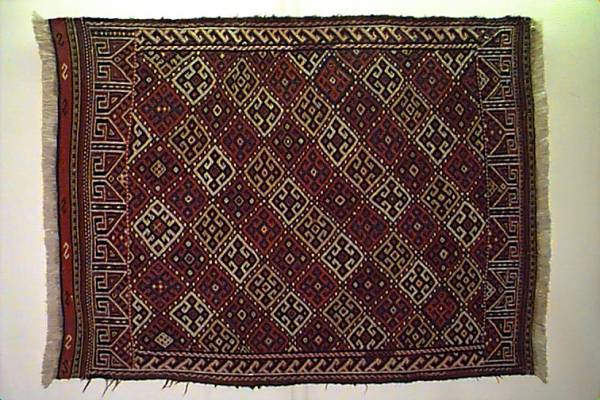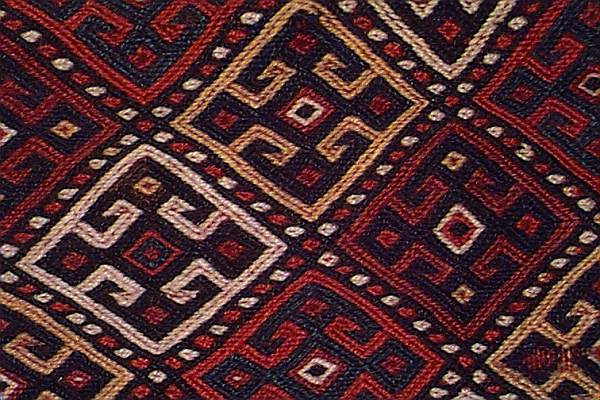Posted by Vincent Keers on 08-09-2002 11:27 AM:
Kurdish? Needle work?
Dear Michael,
I'll throw in a weaving.


The design feels Kurdish and Turkman at the same
time.
There's a change in the field design at the left (the top) side.
I
like the design in the two panels at the end.
It has groundwefts so
isn't it Kurdish?
It isn't soumack. Think of it as needle
work.
Qashqai?
I allways thought of weftless work as lazy
work.
Cheaper/faster to produce export quality.
Your salon didn't (not
yet) change this.
 No
this isn't angry, this is me thinking.
No
this isn't angry, this is me thinking.
A very difficult exersize for me as
you can see!
Hope you like the needle work.
Thanks for the
salon,
Vincent
Posted by Michael Wendorf on 08-09-2002 03:41
PM:
fast and easy
Hi Vincent:
I think you are quite correct, at least in part. One
explanation for Kurds weaving in the weftless transverse soumak technique is
that it can be done very fast. Since it is not used in commercial weavings that
I know of, I do not think cheaper is relevant at least not in the context we
think of it - the race to the bottom to produce always cheaper and cheaper cost
to produce commercial goods.
I also think your perception fails to take
into consideration the care and quality that the majority of these weavings
express. I do not consider the pieces to be lazy work. Quite the opposite.
Moreover, if they reflect an effort to just produce something faster and/or
more cheaply why not just slop it together, why use so many colors, etc.? The
examples I have used to illustrate this Salon, at least, do not fall into the
category of lazy, cheap, commercial weavings; at least in my
opinion.
The piece you illustrate looks like an overlay - underlay
brocade to me. And the existence of groundwefts does not have significance to
me. If it is a brocade, I would expect ground wefts. Could be a Quchan
piece.
Are you sure it is needle work? I doubt it.
Best,
michael
Posted by Vincent Keers on 08-09-2002 08:01 PM:
A lot
Hi Michael,
It's because I never saw any old weftless soumack but
I could buy wagon loads
2x3 meter weftless soumack, brand new from Iran and
very cheap. So that's why
I'm
 trying to get my self
trying to get my self  thinking a different way.
thinking a different way.
Needle work? It's because if a design is made
starting at one point, making a journey
going left up, rigth up, down right,
down left ending at the same point, and the centre
is made the same
way...different colour....creating a rhomb, it looks like needle work to
me.
At what point could she weave a ground weft if the design wefts aren't
continued
(and skipping the warps), at the back horizontally?
But
I'll go for Marla's book now....where is it?........oohh....under my
Pillow.....
Yep...found it. She tells us that some mix up brocade with
needle work.
But she doesn't explain what I'm looking at, and tried to
discribe above.
Maybe I should make a picture?
Oops........hope this
doesn't upset Marla.
Sometimes people mix up needle work with brocade
Best regards,
v
i
n
c
e
n
t

Posted by Michael Wendorf
on 08-09-2002 08:55 PM:
Iran made 2 x 3 weftless soumak
Dear Vincent:
The weftless soumaks I am referring to are all old
pieces from eastern Anatolia. The are all sacks, saddlebags etc. I do not know
the 2 x 3 pieces you refer to that are coming rom Iran. Perhaps you could post
images of the front and back of one?
Thanks, Michael
Posted
by Vincent Keers on 08-10-2002 04:30 AM:
Oh,
Sorrry Michael. Can't deliver.
I traded soumack in sizes
2x1.4 meter that I got directly from Iran In the years 1996/1999.
Qashqai,
beautifull, straight etc. But I couldn't get enough of them and they where
expensive.
Then a guy told me he could deliver at a much lower price. I'm
Dutch, so I was very intrested.
When he showed me some pieces they were
floppy, look-a-like and weftless. He could deliver in all sizes.
I wasn't
intrested.
I did make some pictures at the locations I sold the real stuff.
I'll have a look in my files.
Best regards,
Vincent
Posted by Michael Wendorf on 08-10-2002 09:28 AM:
Qashqai pieces
Hi Vincent:
I think I know the Qashqai pieces you refer to. I
think we are talking about two different things - those weavings and the
weavings I am calling weftless soumaks that were made in eastern Anatolia by
Kurdish weavers. Go under your pillow and take a look at the section in Marla's
book on weftless soumak. In the second edition there is a section on page 68.
It shows the construction and the distinctive padded look of these weavings.
These are different from the weavings from Iran you have handled, I
think.
Grooten uit Ann Arbor. Michael


 No
this isn't angry, this is me thinking.
No
this isn't angry, this is me thinking.